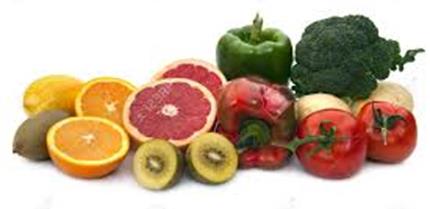What is Vitamin C?
Vitamin C, also known by its scientific name – ascorbic acid, is a water soluble vitamin. It is not stored in large amounts in the body – any extra amount will be excreted through the urine. Some animals produce their own vitamin C but humans must get this vitamin from food or health supplement.
Fruits and vegetables are the best sources of vitamin C:
- Fruits: Guava, papaya, Citrus fruits (such as oranges and grapefruit), kiwifruit and strawberries.
- Vegetables: broccoli and tomatoes.

** Fun Fact: One whole guava contains 206 mg of vitamin C while an orange (medium) contains 59-83mg of vitamin C
Importance of vitamin C
Vitamin C is essential for a variety of physiological function such as formation of collagen – a protein than gives structure to bones, cartilage, muscle and blood vessels. Vitamin C also is known to be a naturally antioxidant, helping to protect cells from the damage caused by free radicals.
Human with severe deficiency of vitamin C, cannot replace the collagens in their body and thus different types of tissue breaks down, leading to scurvy – a disease characterized by swollen bleeding gums and redness, poor wound healing and loss of teeth. Today, vitamin C deficiency and scurvy are rare. Overt deficiency symptoms occur only if vitamin C intake falls below approximately 10 mg/day for many weeks.
Recommended Vitamin C Intake for Malaysian
|
Groups
|
Age
|
Recommended Nutrient Intake (RNI) (mg/day)
|
|---|---|---|
| Infants |
0-5 months
|
25 mg
|
|
6-11 months
|
30 mg
|
|
| Children |
1-6 years old
|
30 mg
|
|
7-9 years old
|
35 mg
|
|
| Adolescent |
10-18 years old
|
65 mg
|
| Adults |
–
|
70 mg
|
| Pregnancy |
–
|
80 mg
|
| Lactation |
–
|
85 mg
|
Health Benefits
Some studies have shown that Vitamin C is possibly effective for:
- Common cold. Vitamin C has long been a popular remedy for cold. However, review of various studies done on vitamin C showed that there is no evidence that vitamin C supplementation is effective to prevent cold. Nevertheless, people that are taking vitamin C supplements regularly tend to have shorter duration and severity of cold. Unfortunately, using vitamin C after getting a cold does not seem to have the same effects.
- Cancer. Studies shown that high intake of vitamin C from fruits and vegetables might decrease the risk of getting cancer but same effect is not observed with vitamin C supplements.
- Age-related macular degeneration (AMD). In a large study, older people with AMD that are taking vitamin C with zinc, vitamin E, beta carotene and copper had slower progression to advanced AMD with vision loss than those who did not take those health supplements.

Adverse Reaction
Vitamin C is generally SAFE when taken in recommended doses.
Common adverse reactions are nausea, diarrhoea and stomach cramps.
However, intake of high dose vitamin C (>2000mg) for long term are not recommended. It may cause severe side effects such as severe diarrhoea and kidney stones (that may cause kidney injury).

|
Groups
|
Age
|
Tolerable Upper Intake Levels (UL) (mg/day)
|
|---|---|---|
| Infants |
–
|
Not possible to establish; source should be milk and food only |
| Children | 1-3 years old | 400 mg |
| 4-8 years old | 650 mg | |
| 9-13 years old | 1200 mg | |
| Adolescent | 14-18 years old | 1800 mg |
| Adults | > 19 years old | 2000 mg |
| Pregnancy & Lactating | 14-18 years old | 1800 mg |
| > 19 years old | 2000 mg |
Precaution
For patients with blood conditions such as:
- Glucose 6-phosphate dehydrogenase (G6PDH) deficiency – High doses of vitamin C may precipitate haemolysis (red blood cell destruction).
- Hemochromatosis (which causes body to store too much iron) – High doses of vitamin C could worsen iron overload (see interaction).
Interactions
Vitamin C may:
- Decrease the effectiveness of medications for treatment of cancer, HIV/AIDS and lowering cholesterol.
- Increase the absorption of iron. For patients that requires iron supplement (eg: pregnant lady), it is recommended that the iron supplement be taken together with vitamin C.
Advisory
- Food (fruits and vegetables) are the best source of vitamin C.
- Talk to your doctor and pharmacist before taking vitamin C supplements, especially in high doses.
- Do NOT take vitamin C supplements if you have:
- Recurrent kidney stone
- Renal impairment or on chronic hemodialysis
- Blood disorder (G6PDH deficiency and hemochromatosis)
References
- Recommended Nutrient Intakes for Malaysia, Ministry of Health. Retrieved 11 April 2016; from www.moh.gov.my/images/gallery/rni/10_chat.pdf
- Vitamin C Fact Sheet for Consumers, National Institutes of Health, U.S Department of Health and Human Services; Retrieved 2 August 2016; from https://ods.od.nih.gov/factsheets/VitaminC-Consumer/
- Vitamin C (Ascorbic Acid), Natural Medicines Professional Monograph. Retrieved 11 April 2016; from https://naturalmedicines.therapeuticresearch.com/databases/food,-herbs-supplements/professional.aspx?productid=1001
- Vitamin C, Memorial Sloan Kettering Cancer Center. Retrieved 11 April 2016; from https://www.mskcc.org/cancer-care/integrative-medicine/herbs/vitamin-c
- Vitamin C for preventing and treating the common cold, Cochrane. Retrieved 11 April 2016; http://www.cochrane.org/CD000980/ARI_vitamin-c-for-preventing-and-treating-the-common-cold
- Vitamin C injection for cosmetic, Health Technology Assessment Section, Medical Development Division, Ministry of Health Malaysia. Retrieved 11 April 2016; from www.moh.gov.my/index.php/database_stores/attach…/348/199
- Food Sources of Vitamin C, Dietitians of Canada. Retrieved 3 August 2016, from http://www.dietitians.ca/Your-Health/Nutrition-A-Z/Vitamins/Food-Sources-of-Vitamin-C.aspx
| Last Reviewed | : | 08 September 2016 |
| Writer/Translator | : | Yu Yong King |
| Accreditor | : | Noraisyah bt. Mohd Sani |







